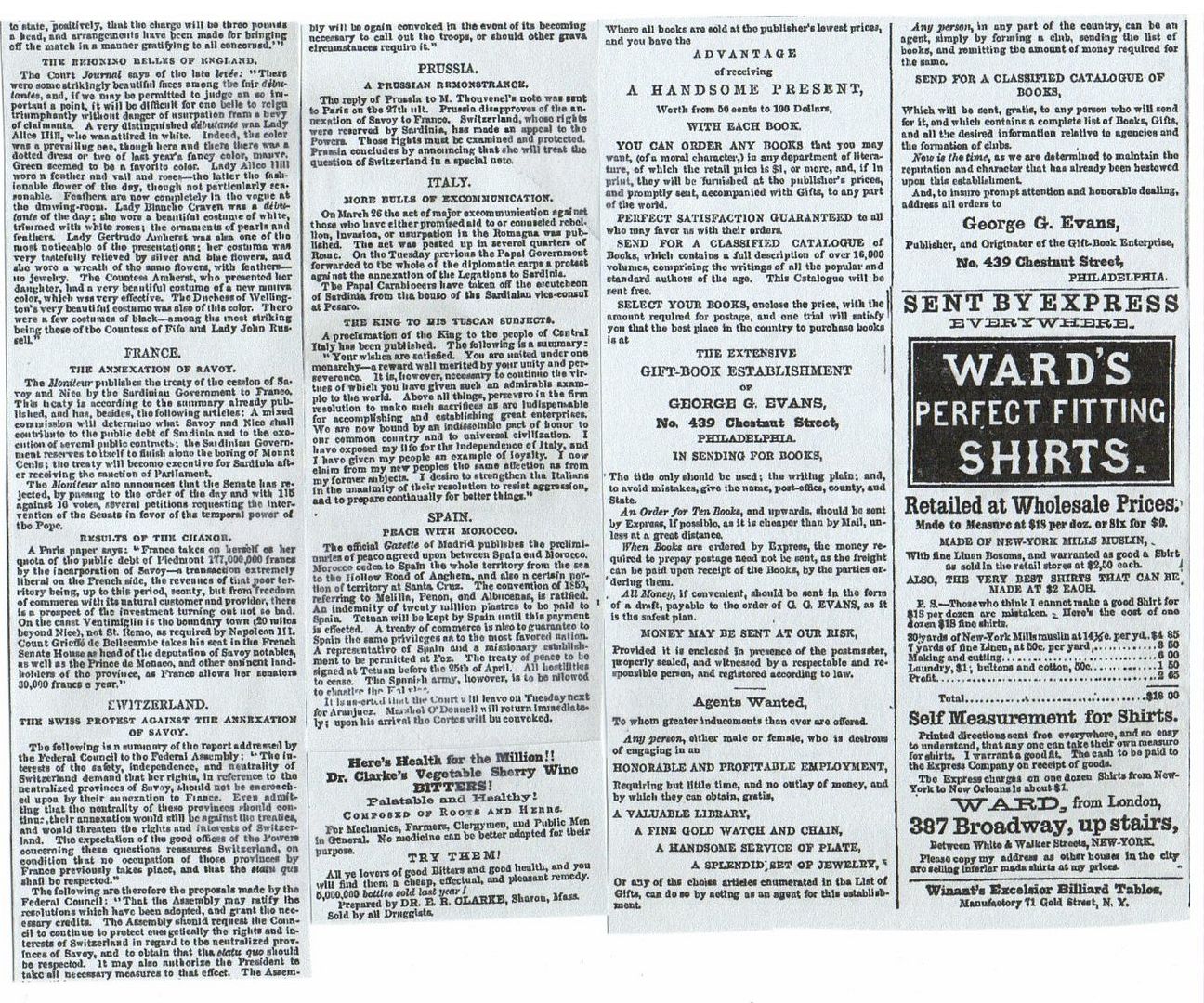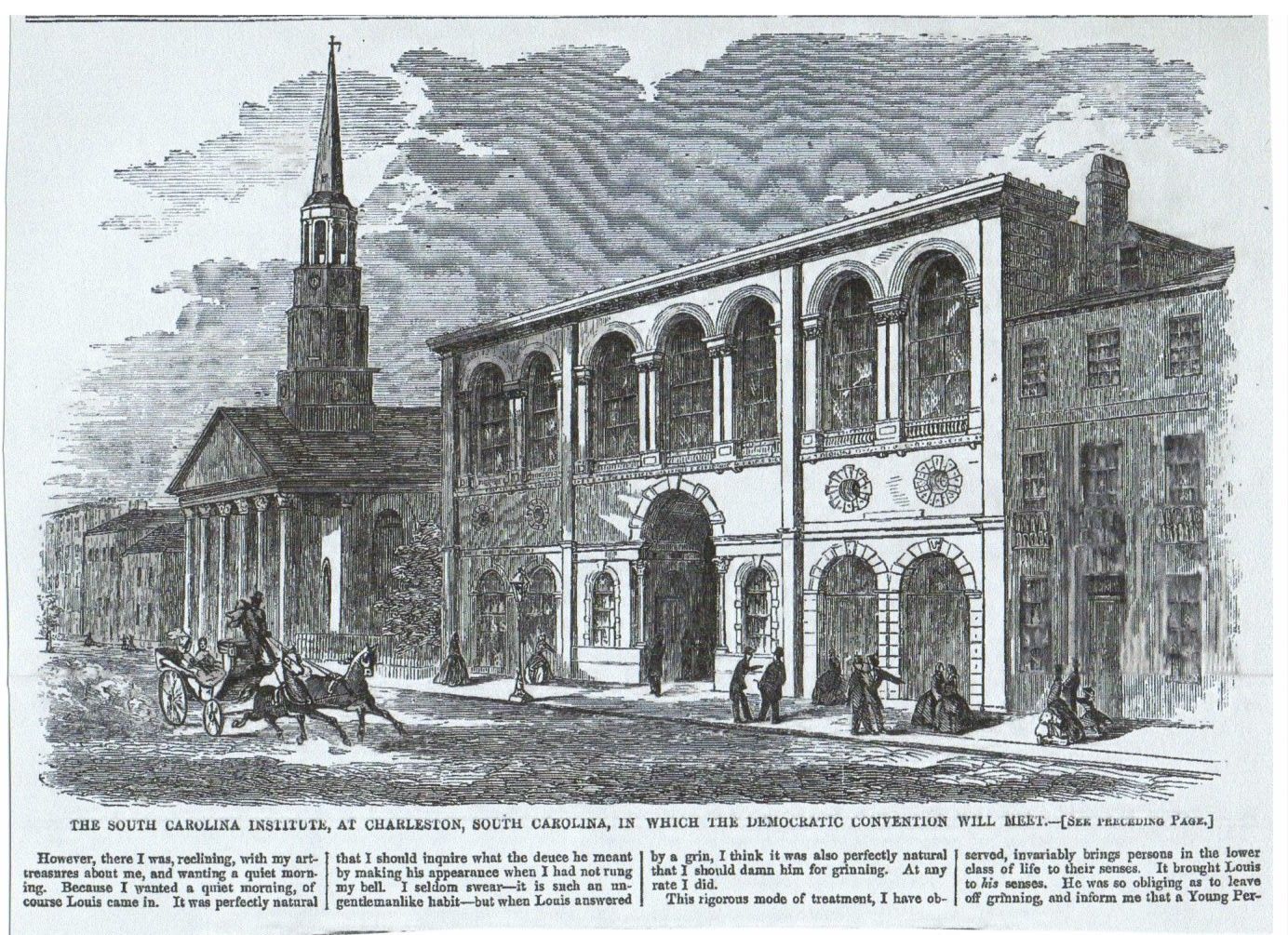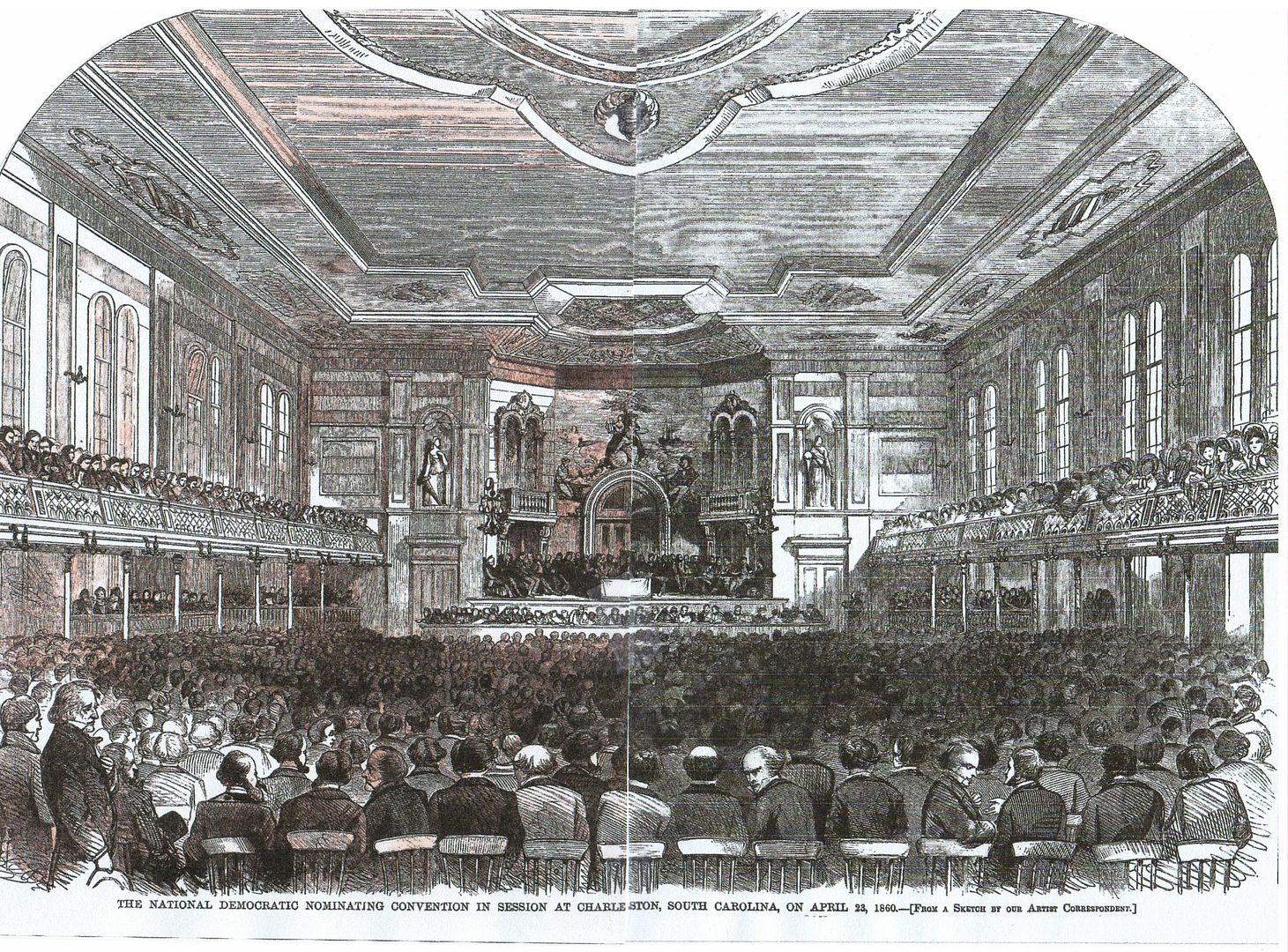
Posted on 04/21/2020 7:13:30 AM PDT by Homer_J_Simpson
























Free Republic University, Department of History presents U.S. History, 1855-1860: Seminar and Discussion Forum
Bleeding Kansas, Dred Scott, Lincoln-Douglas, Harper’s Ferry, the election of 1860, secession – all the events leading up to the Civil War, as seen through news reports of the time and later historical accounts
First session: November 21, 2015. Last date to add: Sometime in the future.
Reading: Self-assigned. Recommendations made and welcomed.
Posting history, in reverse order
To add this class to or drop it from your schedule notify Admissions and Records (Attn: Homer_J_Simpson) by reply or freepmail.

The Diary of George Templeton Strong, Edited by Allan Nevins and Milton Halsey Thomas
Harper's thinks Douglas the most likely Democrat candidate, and mentions several others who we will probably see again:
Thanks for the rundown. You can’t tell the players without a program.
CHARLESTON, S. C., Steamer S.R. SPAULDING, Sunday, April 22, 1860
DEAR SARAH: We came here after a very pleasant passage of from Wednesday at night (6 o'clock) till Friday at 10 P.M. We lay on the quarantine ground till morning, when about 8 o’clock we came up to the city and skirted along its whole length with flags flying, guns firing, and drums beating all in the finest style. Fisher and Clemence were very seasick but are all right now. George was also very sick. For myself, I ate five times a day, slept soundly, smoked incessantly, and drank sparingly. Charleston is much the same apparently that it has been for a half century. Do you remember that the first time I ever spent any considerable hours with you was at the American House, Boston, just previous to your voyage to Charleston? It has occurred to my thoughts more than once. I felt sad at parting from you, but I thought then I should see you again, although you thought not so. You will see by the enclosed prospectus (which I pray you preserve) that I have visited the school at Georgetown. I am more in favor than ever of sending Blanche1 there; you will agree with me when you visit for yourself, as we will do next Winter.
How are all at home? I long to be with you at home again with an inexpressible longing. We shall start probably a week from today and be home in four days. Love to all.
BENJ.
* “I have not read the life of Butler, although I am awaiting it with some curiosity. I read, however, in one of the reviews, of his tribute to his wife. ‘My wife,’ he says, ‘with a devotion quite unparalleled, gave me her support by accompanying me, at my earnest wish, through the War of the Rebellion, and made for me a home wherever I was stationed in command. Returning home with me after I retired to civil and political life, Mrs. Butler remained the same good adviser, educating and guiding her children during their young lives with such skill and success that neither of them ever did an act which caused me serious sorrow or gave the least anxiety on their behalf. . . .
“I had the great honor and pleasure of knowing Mrs. Butler, and this allusion of her husband brings her to mind. I have often thought if I were in the book-writing business that I should sketch a few lives which have come within the range of my own; lives based upon a perfect marriage. That of General Butler should have the first place. His marriage was one of singular felicity. Mrs. Butler was a woman of extraordinary ability, in intellectual force the equal of the General, and that means a great deal; for in mental force Butler is one of the first men of the age. She had more self-command than the General, had a singular grace and dignity, a consciousness of power and genius which attracted you with a sentiment of respect and admiration. She was an exquisite reader, and only surpassed in my knowledge by Fanny Kemble. Shakespeare she knew by heart, and, Mr. Donelly will be pleased to learn, had anticipated him in the acceptance of the Baconian theory. She even believed that the music and the imagination of Shakespeare could be found in Bacon, and I remember her reading, one summer evening at her Washington home, many parallel passages in support of this theory.
“It is not, however, the intellectual side of Mrs. Butler that comes back to me now, thinking of her as I read her husband's tribute to her memory, but her high, serene womanliness. Her power over the General was unbounded. ‘I have never,’ he once said to The Spectator, ‘done anything of any import without taking counsel of my wife, and I have never made a mistake except when I failed to follow her advice. This is high praise. I am proud to write it, as due to a noble and gracious memory. Her influence was always for gentleness, peace, mercy; and how much this must have meant at the side of that proud, turbulent nature. . . .
JOHN RUSSELL YOUNG (The Spectator)
[From the Philadelphia Evening Star, July 18, 1891]
1 His daughter, aged 13, who was at the Georgetown Convent, D.C.
SOURCE: Jessie Ames Marshall, Editor, Private and Official Correspondence of Gen. Benjamin F. Butler During the Period of the Civil War, Volume 1: April 1860 – June 1862, p. 1-2;
Good morning Teach.
This, of course caught my eye...
“We lay on the quarantine ground till morning,”
The ship hadn’t called on a foreign port. Why the quarantine?
5.56mm
Maybe it is just a reference to the ship’s mooring spot. They arrived late at night and maybe the plan was to sit tight until morning before tying up at a wharf and disembarking. Or maybe the natives at Charleston were worried about getting Yankee cooties.
The Beast speaks! ;-)
LOL.
5.56mm
HJS: "Maybe it is just a reference to the ship’s mooring spot."
Epidemics were no joke in those days either -- yellow fever, small pox, scarlet fever, typhus, typhoid, etc., etc.
All were frequent, poorly understood and no known cure.
So I'd think quarantine against them was used routinely, perhaps until a ship's crew & passengers could be inspected & cleared by the port's health authorities?
South Carolina suffered small pox epidemics in 1699, 1711, 1738 & 1860.
Charleston also suffered from yellow fever in 1699, 1706 & 1732.
An interesting factiod I discovered during my reading to prepare for this class is that Abraham Lincoln’s first love and Jefferson Davis’s first wife died in epidemics three weeks apart in 1835. Ann Rutledge (typhoid, age 22) and Sarah Knox Taylor Davis (malaria, age 21). The latter was daughter of Zachary Taylor. The couple had been married only three months when they both caught the same virulent strain of malaria in Mississippi.
No wonder his wife loved him, given all the silverware he stole. That’s why he’s known as “Spoons” Butler.
The alternate label for him is “Beast” Butler for calling upon his troops to rape the women of New Orleans.
He makes Hooker look like a saint. The Union generals don’t come much lower than him.
No wonder his wife loved him, given all the silverware he stole. That’s why he’s known as “Spoons” Butler.
The alternate label for him is “Beast” Butler for calling upon his troops to rape the women of New Orleans.
He makes Hooker look like a saint. The Union generals don’t come much lower than him.
April 23. No news of any action by the Democratic Charleston Convention, Douglas, the little giant, said to be losing ground.
The Diary of George Templeton Strong, Edited by Allan Nevins and Milton Halsey Thomas
1860 Illinois Congressional Districts:
Thanks for posting from Catton -- I have that book and can follow along, notice here you've skipped ahead to page #24-25 (paperback edition).
Catton is where I first learned about the role of Fire Eaters in the 1860 Democrats Convention.
"The Coming Fury" begins with Fire Eater William Lowndes Yancey, and follows his role.
As interesting, your quote mentions William A. Richardson from Quincy, Illinois.
Today Quincy and its 18th Illinois Congressional District (Bob Michaels, now Darin LaHood) are solid +15 Rs, but in those days it was Illinois 5 and elected Democrats, beginning with Stephen Douglas, succeeded by William Richardson.
Just northeast of Quincy & Adams County, the electorate changed from majority Democrats to Republicans.
That line is where some of my ancestors settled, we don't know which side they favored, suspect some for each.
Interesting to notice here that Democrat "Beast" Butler supported Jefferson Davis for President at the 1860 Charleston convention.
I must have the same paperback edition of Catton as you. P 24-25 is where it started. Catton is great for providing dates, which allows me to present his narrative in logical and bite-sized excerpts. Periodically he devotes a chapter to deeper background that doesn’t fit that pattern. The first two chapters of The Coming Fury are like that. The other multi-volume narrative I read is the one by Shelby Foote. He is very stingy with dates and doesn’t cover events in chronological order as much as Catton so his writing won’t appear here too often. But his writing is great and his books include some unforgettable stories and anecdotes the I want to share with the class.
Disclaimer: Opinions posted on Free Republic are those of the individual posters and do not necessarily represent the opinion of Free Republic or its management. All materials posted herein are protected by copyright law and the exemption for fair use of copyrighted works.